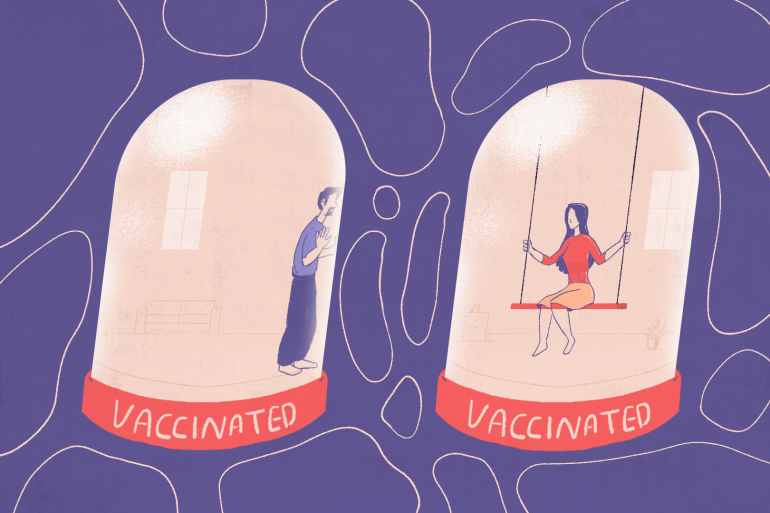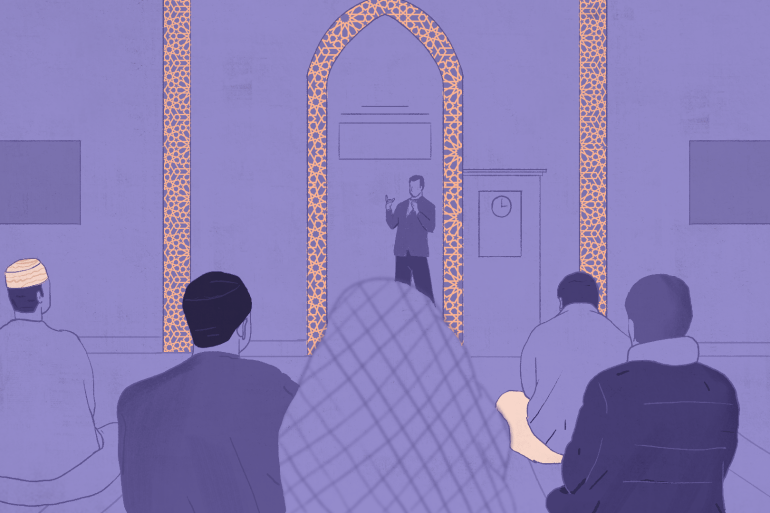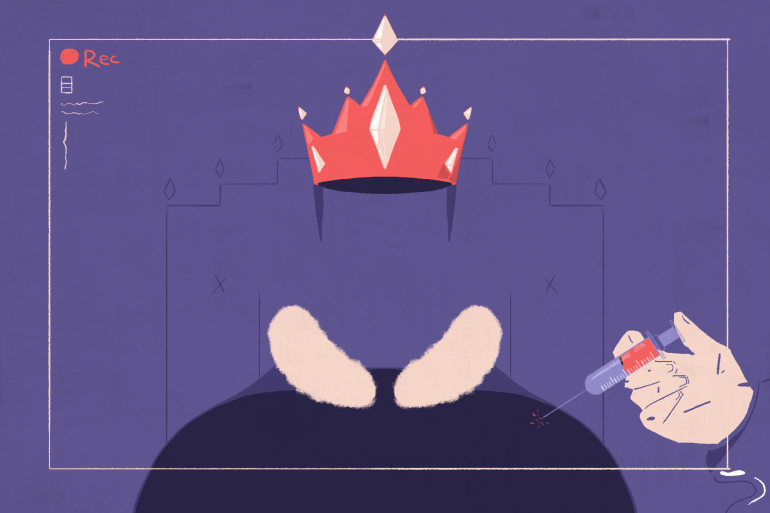Why you must still wear a mask after having a COVID-19 vaccine
Dr Khan explains that even after being vaccinated, you can still pass the virus on, and tells us how he addressed vaccine hesitancy among community members at his local mosque.

Despite the manufacturers of the COVID vaccine recommending a delay of no more than three weeks between the two required doses, the UK took the somewhat bold decision back in December to delay second shots by 12 weeks. This was a calculated risk to allow time for as many people as possible to receive their first shot of the Pfizer-BioNTech or Oxford-AstraZeneca vaccine – the two being used in the UK.
The decision attracted a great deal of criticism from scientists, healthcare professionals and even the vaccine manufacturers themselves, who pointed out that no studies had been carried out to show how long protection from just one shot would last.
Keep reading
list of 4 itemsWhat are the side effects of the COVID-19 vaccines?
Is it safe for pregnant women to have a COVID-19 vaccine?
Patently unfair: Can waivers help solve COVID vaccine inequality?
But, it seems that the UK government’s shot in the dark has paid off.
Just over two months later, Public Health England has announced data showing that a single shot of either the Oxford-AstraZeneca or the Pfizer-BioNTech jab reduces the chance of needing hospital treatment by more than 80 percent. The results focus on older people, who are considered the frailest and least likely to mount a strong immune response.
People who have had their first shot might think they are out of the woods with this outcome. Not so. The second dose is still important for boosting immunity, reducing hospitalisation risk even further and for the length of time for which you are protected. Furthermore, while there is increasing evidence of the vaccines reducing transmission, more research is needed.
Although the virus may not make you ill after having the first vaccine shot, you might still be able to carry it around and pass it to other people through breathing and coughing, so it is imperative we all continue to wear masks and socially distance until the majority of the population is fully vaccinated.
A large cohort of the population in most countries still has not been vaccinated at all. This cohort may be younger and deemed less likely to need intensive hospital treatment should they get COVID-19, but there remains a risk of “long COVID” symptoms, which include long-term pain, poor memory, fatigue and muscle weakness, which can be seriously debilitating.
Progress Report
Will the new one-shot vaccine help to curtail new variants?
Meanwhile, a new single-shot vaccine from Johnson & Johnson has been granted approval by US regulators for use alongside the Pfizer and Moderna vaccines (both two-dose vaccines), eliminating the need for a delay between shots altogether for those who receive it. Johnson & Johnson has agreed to provide the US with 100 million doses by the end of June. The UK, EU and Canada have also ordered doses, and 500 million doses have also been ordered through the COVAX scheme to supply poorer nations.
The Johnson & Johnson vaccine works in a different way from the Pfizer and Moderna vaccines. None of these vaccines contains the coronavirus; the Pfizer and Moderna vaccines use a “messenger” code called RNA to trigger your immune response, whereas the Johnson & Johnson one, like the Oxford vaccine, has a tiny piece of coronavirus DNA that contains information about the virus’s spike protein.
This piece of DNA is inserted into a harmless, genetically modified virus called an adenovirus. The adenovirus has been modified so it cannot multiply inside human cells, but it can carry the coronavirus DNA code to the inside of a human cell when that person has been given the vaccine.
Once inside the human cell, the DNA strand instructs the cell to make coronavirus-type spike proteins which the cell presents on its outside surface. The immune system recognises these spike proteins as “foreign” and starts assembling a range of immune cells targeted at killing them. As well as killing the cell that has been infected by the vaccine DNA, the immune system will make cells that will recognise the spike protein quicker; so, should you come into contact with the real coronavirus, your immune system will be able to destroy it before it has a chance to enter your cells and cause a serious infection.
Johnson & Johnson’s vaccine was always designed to only require one dose and has been tested as such. The one-dose regime is felt by the manufacturer and the US Centers for Disease Control (CDC) to confer enough lasting protection against severe illness.
The fact this vaccine requires only one dose will be welcomed by those who have a phobia of needles but also because it may offer a quicker route to the eventual easing of lockdowns.
The vaccine was tested in a trial involving nearly 44,000 participants in the United States, Latin America and South Africa. In the US cohort, it was shown to be 72-percent effective. However, it was shown to be less effective against the newer South African and Brazilian strains of the virus – giving protection against the virus in only 55 percent and 67 percent of participants respectively.
Results from the first two US-authorised vaccines, Pfizer-BioNtech and Moderna, were considerably stronger, reducing symptomatic infection by about 95 percent. But those vaccines require two doses to achieve that level of immunity. They also come with distribution challenges since they need to stay at ultra-cold temperatures. Because the Johnson & Johnson vaccine contains a more stable DNA molecule rather than the delicate RNA molecules the other vaccines use, it can be stored at normal refrigeration temperatures and therefore can be more easily transported, similar to the Oxford-AtraZeneca vaccine.
New variants emerge when viruses have mutated enough times to produce a new version that becomes dominant over the original one, and which may be more infectious or deadly. That is why we must get the pandemic under control on a global basis.
The World Health Organization’s COVAX programme is designed to get vaccines to those countries that may not have the money or infrastructure to obtain them themselves. The Johnson & Johnson vaccine is going to play a large part in that. A one-shot vaccine would certainly help with access, distribution, compliance and reduce the emergence rate of all of these strains to everyone’s benefit.
As with any approved vaccines, people should not turn them down if they are offered. The Johnson & Johnson vaccine has been approved on the basis that it is effective at preventing serious disease and hospitalisation. It will help reduce the number of people who get really sick from COVID and will help prevent deaths. For that reason, it is worth taking it if offered.

On the Doctor’s Rounds
Speaking at a local mosque about COVID vaccines
I work in a city called Bradford, in the north of England. One of the things I love about Bradford is its culturally diverse population; because of this, I get to see and treat patients from different backgrounds who may often approach health and access healthcare in different ways.
Coronavirus has been labelled the “great equaliser” by many – with the idea that it can affect any of us from any background in equal measure. As well-meaning as that statement may have been, it was wrong. People from ethnic minority backgrounds in Western countries have come off worse during this pandemic. They have been admitted to hospital in higher numbers and, proportionately, more have died.
The reasons for this are complex; historical discrimination, social deprivation, culturally inappropriate health care systems, and language barriers have all played a part. Misinformation about the vaccine is also rife and is finding fertile breeding ground in some of these already-disenfranchised groups. Is it any wonder then, as the COVID-19 vaccines are rolled out, that we are seeing fewer people from minority ethnic backgrounds taking up the vaccine?
One of the ways I try to engage these communities and tackle misinformation is by getting out there to speak with people personally; to really address their concerns and understand what is keeping them from having the vaccine.
Last week, I was invited to a mosque to speak with a group of Muslim men and women and answer any questions they had.
I am often on British television talking about the benefits of the vaccine, but I have always done so in English and, for many of the people who came that evening, English was not their first language so this talk was to be done in Urdu. Now, I am far more comfortable speaking in English than I am in Urdu so, before heading over to the mosque I asked Mama Khan – my mum, who is fluent in Urdu and constantly disappointed in my Urdu skills – to listen to my talk. After getting her seal of approval, I made my way to the mosque.
There were approximately 30 socially distanced people attending the evening talk. Before I launched into my speech, I asked for a show of hands for those people who would not go for the vaccine if offered it; nine hands went up. OK, well if I could convince any of these nine people to go for their vaccines by the end of the evening, I thought, that would be a good thing.
I addressed what I thought were their biggest concerns: the vaccines are halal (they do not contain any animal products or alcohol); the vaccines do not cause infertility; they have been robustly tested through clinical trials; they do not contain a “tracking chip”. After I had finished speaking, I asked if anyone had any questions. A gentleman put his hand up, I nodded to him.
“My daughter told me the vaccines will change my DNA,” he said quietly. “She said I shouldn’t go for it.”
It is a question I get asked a lot.
“The vaccines do not change your DNA,” I told him. “Rather, a tiny piece of genetic code is injected with the instructions to make a small piece of the coronavirus, not the whole thing. These instructions are carried to your cell which then makes the spike protein part of the virus. Your immune system then responds and destroys the cell that has made the spike protein but you also have memory immune cells that will jump into action should you later come into contact with the real coronavirus, as they will quickly recognise its spike protein. Your DNA is left completely intact.”
To be honest, explaining that in Urdu was challenging, but we managed.
A lady then put up her hand.
“I heard they haven’t tested the vaccine on Asian people, so we do not know how we will respond.”
I knew the answer to this one.
“The trials for the vaccine had thousands of people in them, from different countries, different ethnicities and with an array of underlying health conditions. It was tested on a diverse population. There is also no reason to think people from one ethnic group would respond differently to those from another group. We are all genetically identical.”
She nodded.
I related something my mum had told me; she had used the phrase “dawa and dua” which translates as “medicine and prayer”. The two are not mutually exclusive; you can pray for health but you can still see the doctor for your health concerns. You can pray for an end to the pandemic, and that prayer may be answered in the form of a vaccine. Religion and science can work together.
I would not describe myself as a very religious man, but to those people who are praying for a world where people do not die from the coronavirus, these vaccines may just be that miracle we have all been waiting for. After all, they do say God works in mysterious ways.
I finished off by asking the group how many of them would now refuse the vaccine if offered it. Four people raised their hands. That was OK; five had changed their minds. Who knows, they may go on and speak with their friends who are vaccine-hesitant and change their minds too.
My job is to continue getting the correct information out there, so whatever decision people do make, it is an informed one.

And Now, Some Good News
Royal families encourage people to get vaccinated
In the UK, where I live, the royal family is fiercely protective about their medical information and try not to give their opinion on public matters. However, in order to encourage people to take up the COVID-19 vaccine, they have made an exception.
The Queen received her COVID-19 vaccine in January. In a video call in February with health officials in the UK, she said she understood getting a jab could be a “difficult” experience for some people but urged everyone to “think about other people rather than themselves”. There is increasing evidence that the vaccines do reduce transmission rates, so by getting the vaccine you are not only protecting yourselves but also those you may come into contact with.
Soon after, the Duke and Duchess of Cambridge, Prince William and Catherine, spoke via video call to people who had been shielding through the pandemic and were nervous about getting their vaccine. Prince William told one of them: “Catherine and I are not medical experts by any means but if it’s any consolation, we can wholeheartedly support having vaccinations. It’s really, really important. We’ve spoken to a lot of people about it and the uptake has been amazing so far. We’ve got to keep it going so the younger generations also feel that it’s really important for them to have it.”
Wise words from the future king.
They are not the only royals supporting global vaccination programmes. In January, Jordan’s King Abdullah II received his COVID-19 vaccine alongside his son, Crown Prince Hussein, and his uncle, Prince Hassan. The Royal Palace posted pictures on Twitter of them receiving the vaccines, instilling confidence in the vaccine programme to Jordanians.
When royals take action, people do listen and we need everyone to do what they can to encourage people to take up the vaccine and help end this pandemic.
Reader’s Question
How long does protection from the COVID-19 vaccine last?
We do not yet know how long protection from the vaccine will last, but we do know that having the vaccine will protect you against serious illness from the virus. Experts are working hard to understand how long vaccine-induced immunity will last. Preliminary thoughts are that we may need annual booster doses, but getting the vaccine still remains the most effective way to protect yourself and your loved ones from serious illness and death from COVID-19 right now.